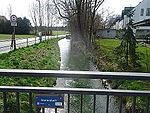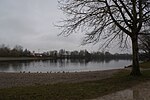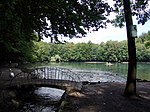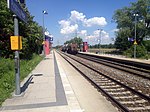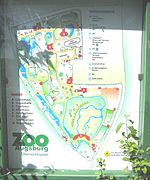Augsburg-Universitätsviertel
Augsburg-Universitätsviertel (English: University Quarter) is one of the 17 Planungsräume (English: Planning district, singular Planungsraum) of Augsburg, Bavaria, Germany. It consists of one Stadtbezirk, (English: Ward) out of the 41 that make up the city, the 32nd, with which its planning district is coterminous. The Universitätsviertel houses the main campus of the University of Augsburg, which was founded in 1970. The planning district also houses the old Augsburg Airport as well as the Volkssiedlung, (English: Public settlement or People's settlement) a public housing development. The district, with many university students, has a lower percentage of foreign-born residents than other areas of Augsburg, with only 13.1% compared to the citywide average of 16.7%. The Universitätsviertel has an area of 3.96 km2 (1.53 mi2), and as of January 1, 2007, a population of 10,824. It is bordered on the south by Inningen, the south and east by Haunstetten, on the north by Hochfeld, and on the west by Göggingen.
Excerpt from the Wikipedia article Augsburg-Universitätsviertel (License: CC BY-SA 3.0, Authors).Augsburg-Universitätsviertel
Inninger Straße, Augsburg Haunstetten-Siebenbrunn
Geographical coordinates (GPS) Address Nearby Places Show on map
Geographical coordinates (GPS)
| Latitude | Longitude |
|---|---|
| N 48.308 ° | E 10.904 ° |
Address
Inninger Straße 6
86179 Augsburg, Haunstetten-Siebenbrunn
Bavaria, Germany
Open on Google Maps

